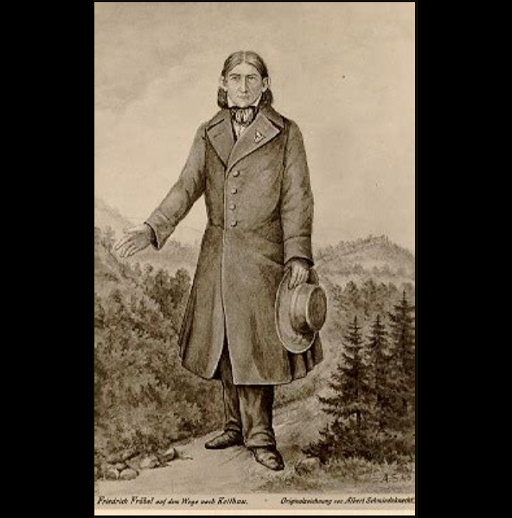Session 3: Friedrich Froebel: a mover and shaker of his day
Introduction
In the previous session you explored some ideas regarding present day practices with very young children and the outdoors. In this session you are going to take a trip back in time to meet one early childhood pioneer named Friedrich Froebel (1782–1852), introduced to you briefly in Session 1. But why is it important to look backwards? Is it not much more important to look forwards to the future and the development of new ideas? In response to such questions, Jonathan Doherty writing in the foreword to the book Early Years Pioneers in Context (Jarvis et al., 2016) writes:
Without a detailed investigation into the lives of the great leaders in early education of the past, their lives, their motivations and inspirations, we would not have the high-quality frameworks for education… that we proudly possess today…. our current frameworks and the curricula for our youngest children are based upon sound foundations that have more than stood the test of time… The word ‘pioneers’…implies individuals who are the ‘movers and shakers’ of their day. True leaders whose wisdom as well as their drive and outstanding resilience in the face of adversity inspire us through their charting of new territories and new ideas.
Froebel is particularly relevant to our discussion, not only because, according to Weston (1998), he is ‘probably the most influential educationalist of the nineteenth century’ (p. 1), but also because he has had a significant impact on our thinking about young children, the outdoors and nature. He is probably best known for setting up the first early year’s educational setting outside the home in rural Germany in 1837. He later coined the term ‘kindergarten’ (1840) – literally a garden for children – to describe this setting, designed to support young children’s growth and development in harmony with the natural world ‘through doing, feeling, and thinking’ (Wasmuth, 2020, p. 62).
In this work, he was particularly influenced by the Swiss educator Pestalozzi who advocated for ‘learning by head, hand and heart’. At the time, Froebel’s ideas were seen as revolutionary but over time much of his thinking has been incorporated into mainstream practice.
In this session you are going to start by exploring Froebel’s original writing and thinking about how he understood the relationship between the youngest children, the adults who care for them and the natural world. You will then consider how Froebelian thinking has influenced current practice in ECEC (Early Childhood Education and Care). Finally, you will reflect on what Froebel can offer in terms of developing practice to support the youngest children.
By the end of this session, you should be able to:
- describe key aspects of Froebelian thinking regarding young children and the outdoors
- identify how Froebel’s thinking influences current practice
- outline how Froebel’s principles are relevant when caring for the youngest children in the twenty-first century.
Before you begin the session, listen to the author Nicola Kemp introducing its content.
Transcript
NICOLA KEMP: Welcome to Session 3. You might be wondering why we have dedicated a whole session to Froebel who, as we outlined in Session 1, is one of many early childhood educators to recognise the importance of time spent outdoors for young children. There are many different answers to this question. And throughout this session, you will be introduced to some possible responses from the perspectives of all contributing experts. These interviews, many conducted on location at the Froebel archive at the University of Roehampton, one of the highlights as we develop this course and gave us new insights and understanding about the enduring relevance of Froebel's philosophy and practice.
Archivist Kornelia Cepok picks out some of her favourite resources in the archive and discusses what they mean to her. Dr Sasha Powell, chief executive of the Froebel Trust, discusses the relevance of Froebelian principles to practice in the 21st century and how the Trust supports practitioners to develop their practice with babies and toddlers outdoors. Dr Maria Cooper and practitioner Shirlene discuss what Froebelian principles look like in the bicultural context of New Zealand. Dr Fengling Tang discusses Froebel's ideas about play, including resources called the gifts that he developed.
Finally, Froebelian practitioner and scholar Professor Tina Bruce reminds us that Froebel was the first early childhood educator to really focus on babies and toddlers and their learning and development needs. Using resources gathered during her many years of practice, she illustrates practically how adults can engage the youngest children with the natural world. We hope that by the end of this session you will have developed your own understanding and ideas about the contemporary relevance of Froebel. We also hope that you'll be inspired to find out more and read some of his work directly by visiting the online archive hosted by the University of Roehampton.

